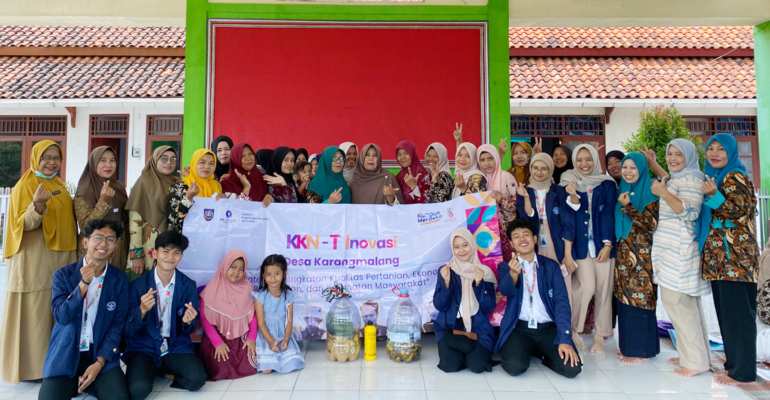Utilizing Household Waste: IPB University Innovation KKNT Team Makes POC with Karangmalang Village Family Empowerment and Welfare (PKK) Women

Households are one of the largest sources of waste in Indonesia, contributing 40.91 percent of total waste, higher than the amount of waste generated in traditional markets at 17.35 percent. According to the Ministry of Environment and Forestry (KLHK), the largest component of waste is food waste, which accounts for 39.81 percent of all waste.
The IPB University Innovation Real-Thematic Work Lecture (KKNT) student team in Karangmalang Village, Tegal Regency, Central Java collaborated with Family Empowerment and Welfare (PKK) women to hold educational activities and practice making liquid organic fertilizer (POC) from household waste. This activity is in line with the theme of KKNT Inovasi IPB University, namely ‘Sustainable Development of Agromaritime Communities to achieve Socio-Resilience’.
The activity held at Karangmalang Village Hall was attended by 32 PKK women and guided directly by IPB University students from the Faculty of Agriculture. In her speech, Maylaffayza Permata Shifa, one of the KKNT Inovasi team members said that the main purpose of this activity was to empower women and spread community knowledge about the use of household waste into organic fertilizer that is environmentally friendly and beneficial for plants.
Furthermore, she explained, “POC has many benefits including increasing soil fertility which helps improve soil structure and increase organic matter content, contains complete nutrients needed by plants, and is environmentally friendly so as to reduce organic waste and not pollute the environment.”
In this activity, the KKNT Inovasi IPB University team provided training to PKK women on how to produce POC from various types of household waste, such as leftover vegetables, fruits, and rice washing water.
“The PKK women were very enthusiastic about participating in this training and asked many questions about how to make POC correctly. Hopefully, this program can bring real benefits to the local community. Hopefully, with the knowledge and skills gained, they will be able to make their own POC at home and use it as fertilizer for their plants,” said Shifa. (*/Rz) (IAAS/ZQA)



